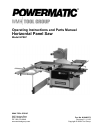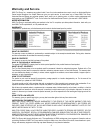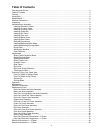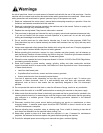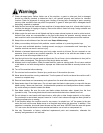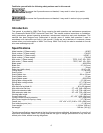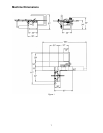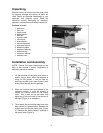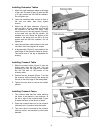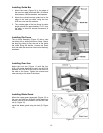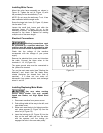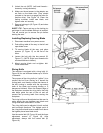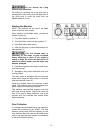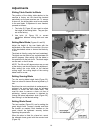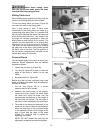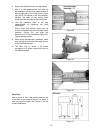
5
17. Check damaged parts. Before further use of the machine, a guard or other part that is damaged
should be carefully checked to determine that it will operate properly and perform its intended
function. Check for alignment of moving parts, binding of moving parts, breakage of parts, mounting
and any other conditions that may affect its operation. A guard or other part that is damaged should
be properly repaired or replaced.
18. Keep the floor around the machine clean and free of scrap material, saw dust, oil and other liquids to
minimize the danger of tripping or slipping. Be sure the table is free of all scrap, foreign material and
tools before starting to cut.
19. Make certain the work area is well lighted and that a proper exhaust system is used to minimize dust.
Anti-skid floor strips are recommended on the floor area where the operator normally stands and
each machine’s work area should be marked off. Provide adequate work space around the machine.
20. Keep visitors a safe distance from the work area. Keep children away.
21. Make your workshop child proof with padlocks, master switches or by removing starter keys.
22. Give your work undivided attention. Looking around, carrying on a conversation and “horse-play” are
careless acts that can result in serious injury.
23. Maintain a balanced stance and keep your body under control at all times. Do not overreach or use
excessive force to perform any machine operation. Do not stand in line with the saw blade or work
piece and do not allow anyone else to do so.
24. Use the right tool at the correct speed and feed rate. Do not force a tool or attachment to do a job for
which it was not designed. The right tool will do the job better and safer.
25. Maintain tools in top condition. Check the saw blade for cracks or missing teeth. Do not use a cracked
or dull blade or one with missing teeth or improper set. Make sure the blade is securely locked on the
arbor.
26. Turn off the machine before cleaning.
27. Do not stand on the machine. Serious injury could occur if the machine tips over.
28. Never leave the machine running unattended. Turn the power off and do not leave the machine until it
comes to a complete stop.
29. Remove loose items and unnecessary work pieces from the area before starting the machine.
30. Keep hands clear of the blade area. Do not reach past the blade to clear parts or scrap with the saw
blade running. Never saw free hand. Avoid awkward operations and hand positions where a sudden
slip could cause your hand to contact the blade.
31. Saw blade rotation: Be sure the main saw blade rotates clockwise when viewed from the front
(operator’s side). The scoring blade should rotate counterclockwise when viewed from front.
32. Do not attempt to saw boards with loose knots or with nails or other foreign material, on its surface.
Do not attempt to saw twisted, warped, bowed or “in wind” stock unless one edge has been jointed for
guiding purposes prior to sawing.
33. If the operator leaves the machine area for any reason, he should turn “off” the power to the saw
motor and wait until the saw blade comes to a complete stop before his departure. In addition, if the
operation is complete, he should clean the saw and the work area. NEVER clean the saw with power
"on" and never use the hands to clear sawdust and debris; use a brush or compressed air.
34. Use only Powermatic or factory authorized replacement parts and accessories; otherwise the
warranty and guarantee is null and void.



